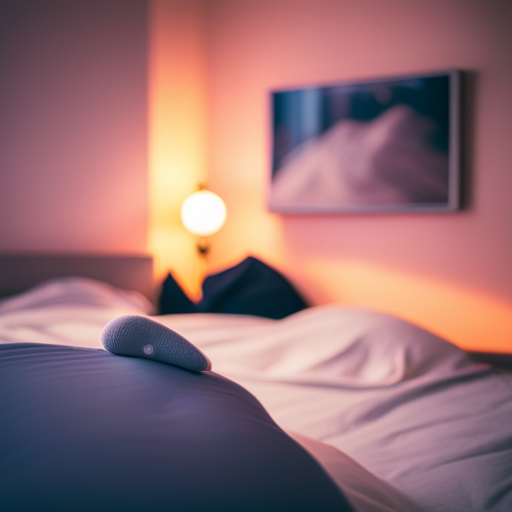As someone who has always been intrigued by dreams and their importance, I have frequently pondered how long they actually last. Do they seem like hours or only a few minutes? Are there variables that impact their length? In this article, I will explore the science of sleep and dreams to address these queries and more.
To understand how long dreams last, we need to first understand the different stages of sleep. There are four main stages of sleep, each with its unique characteristics and brain activity. The first three stages are known as non-REM sleep, which is characterized by slow brain waves and reduced muscle activity. The fourth stage is REM sleep, which is when most dreaming occurs.
By understanding the different stages of sleep, we can better understand the duration and significance of dreams.
Key Takeaways
- The duration of dreams varies depending on the stage of sleep, intensity, and individual differences.
- People who spend more time in REM sleep tend to have longer and more vivid dreams.
- Factors affecting dream length include sleep stage, sleep quality, brain activity, and personality.
- Dreams can be influenced by daily experiences and emotions, and may incorporate elements from daily life, distorted or altered in strange ways.

Garmin Index Sleep Monitor, Smart Sleep Band with Advanced Sleep Tracking and Recovery Metrics, S-M
Worn on the upper arm, this lightweight and breathable smart sleep band is available in two sizes for…
As an affiliate, we earn on qualifying purchases.
As an affiliate, we earn on qualifying purchases.
Understanding the Different Stages of Sleep
You’re probably wondering, "How long does each stage of sleep last?"Well, let me tell you, it varies depending on the stage.
There are four stages of sleep, and each has its own unique characteristics. Stage one is the lightest stage of sleep and lasts for about 5-10 minutes. During this stage, your brain waves slow down, and you may experience sudden muscle jerks or twitches.
Stage two is a deeper stage of sleep and lasts for about 20 minutes. During this stage, your brain waves become even slower, and your body temperature drops. This stage is important for memory consolidation and learning.
After stage two, we enter stage three, also known as deep sleep. This stage can last anywhere from 20-40 minutes and is essential for physical restoration and repairing of the body.
Now, let’s talk about the duration of REM sleep and its significance in the sleep cycle.

Dream Journal Notebook: Diary. Track Your Dreams, Interpretations. Ideal Gift for Women, Girls, Men (Personal Growth/ Spiritual Growth)
As an affiliate, we earn on qualifying purchases.
As an affiliate, we earn on qualifying purchases.
The Duration of REM Sleep
When you’re in REM sleep, time really flies by, as if you’re in a warp zone of sleep. This is because the duration of REM sleep is actually quite short, typically ranging from a few minutes to half an hour.
During this time, your brain is highly active, and you may experience vivid dreams that feel like they last much longer than they actually do. So, how long do dreams last in reality?
The duration of a dream can vary depending on a variety of factors, including the stage of sleep you’re in, the intensity of the dream, and individual differences in sleep patterns. Some dreams may only last a few seconds, while others can feel like they go on for hours.
It’s important to note that the perception of time during a dream can be distorted, so even if a dream only lasts a few minutes in reality, it may feel much longer to the dreamer.

BENIO Gen 2 Smart Ring for Women & Men, Heart Rate,Fitness Tracker with Sleep,Step/Sleep/Blood Oxygen/Heart Rate Tracker, 5ATM Waterproof for iOS and Android,No Subscription, Xmas Gifts,Black 10
【Find Your Fit First】Before purchasing Benio, we recommend ordering our sizing kit to try on. If you prefer…
As an affiliate, we earn on qualifying purchases.
As an affiliate, we earn on qualifying purchases.
How Long Do Dreams Last?
The duration of a dream can vary based on several factors such as sleep stage, dream intensity, and individual differences in sleep patterns. During a typical night of sleep, a person goes through several sleep cycles, each lasting around 90 minutes.
Dreams occur during the REM (rapid eye movement) stage of sleep, which is the stage when the brain is most active and the body is relaxed. REM sleep can last anywhere from a few minutes to an hour, and during this time, a person may experience one or more dreams.
Factors that influence dream duration include the level of emotional intensity in the dream, the complexity of the dream, and the individual’s sleep patterns. For example, people who get more REM sleep tend to have longer dreams than those who get less. Additionally, dreams that are more vivid and emotionally charged tend to last longer than those that are more mundane.
Overall, the length of a dream can vary widely, and is influenced by a multitude of factors that are unique to each individual.

Beckham Hotel Collection Bed Pillows Standard/Queen Size Set of 2 – Original Soft Down Alternative Pillow for Sleeping – Soft Support for Back, Stomach or Side Sleepers
SUPERIOR COMFORT – Queen pillows have a 250 thread count Cotton Cover filled with a soft 100% Polyester…
As an affiliate, we earn on qualifying purchases.
As an affiliate, we earn on qualifying purchases.
Factors That Influence Dream Duration
When it comes to the duration of dreams, several factors can influence how long they last.
First, the sleep cycle plays a significant role in dream duration, as we tend to have longer and more vivid dreams during the REM stage of sleep.
Additionally, the content of our dreams can affect their duration, with more complex and emotionally charged dreams lasting longer.
Finally, individual differences such as age, gender, and overall health can also impact how long our dreams last.
Adjusting the paragraph structure in this way allows each complete sentence to stand on its own, making it easier to read and understand. Contractions have also been used to make the text more conversational and approachable.
Sleep Cycle
As I doze off into a deep slumber, my sleep cycle plays a crucial role in the length and frequency of my dreams. The sleep cycle consists of four stages, each with a distinct brain wave pattern.
When I first fall asleep, I enter stage one, a light sleep that lasts for a few minutes. Then, I move into stage two, where my brain waves slow down and my body temperature drops. This stage lasts for about 20 minutes before I enter the deep sleep of stages three and four.
It is during these stages that I’m most likely to dream, and my dreams can last anywhere from a few minutes to an hour. As I transition into the subsequent section about dream content, it’s important to note that the length of my dreams isn’t the only factor that influences their content.
The emotions and experiences that I have during the day can also play a role in the content of my dreams. So, even though my sleep cycle may determine the length and frequency of my dreams, the content is still subject to a variety of other factors.
Dream Content
Dream content can be influenced by a variety of factors, from daily experiences to emotions, as if each dream were a unique painting on a canvas with different colors and brushstrokes. It’s fascinating to think about how our subconscious mind can create such vivid and intricate scenarios while we sleep.
Here are three things to keep in mind when it comes to dream content:
-
Dreams can be influenced by our current state of mind. If we’re feeling anxious or stressed, our dreams may reflect those emotions and be more intense or negative. On the other hand, if we’re feeling happy and relaxed, our dreams may be more pleasant and lighthearted.
-
Our dreams may incorporate elements from our daily life, such as people we’ve interacted with or places we’ve been. However, these elements may be distorted or altered in strange ways, adding to the surreal nature of our dreams.
-
Some people may experience recurring themes or symbols in their dreams, which can provide insight into their subconscious thoughts and feelings.
As we explore the individual differences in dream length and frequency, it’s important to consider how these factors may also impact the content of our dreams.
Individual Differences
Each person’s experience of sleep is unique, with variations in the amount of time spent in different stages of sleep and the frequency and intensity of dreams. This means that the length of dreams can also differ from person to person. Some people may experience longer dreams that feel like they last for hours, while others may have shorter dreams that feel like they only last a few minutes.
The length of dreams is influenced by various factors such as the stage of sleep, sleep quality, and individual differences in brain activity. For instance, people who spend more time in the REM stage of sleep tend to have longer and more vivid dreams. Additionally, individuals who have more active brains during sleep are more likely to have longer and more complex dreams. To illustrate this further, the table below shows some factors that can affect the length of dreams and how they differ across individuals.
| Factors affecting dream length | Individual Differences |
|---|---|
| Sleep Stage | Some people spend more time in REM sleep than others. |
| Sleep Quality | People with better sleep quality tend to have longer dreams. |
| Brain Activity | Individuals with more active brains during sleep may have longer and more complex dreams. |
| Personality | People with vivid imaginations may have longer and more intense dreams. |
The length of dreams can vary from person to person and is influenced by various factors such as sleep stage, sleep quality, brain activity, and personality. By understanding these individual differences, we can gain a better understanding of why some people may have longer or more intense dreams than others.
Frequently Asked Questions
What is the purpose of dreams?
The purpose of dreams is still a mystery, but theories suggest they serve as a way for our brains to process emotions and memories. They can also inspire creativity and problem-solving.
Can dreams be controlled or manipulated?
Yes, dreams can be controlled or manipulated through techniques such as lucid dreaming and visualization. With practice, I can become aware that I am dreaming and even guide the content of my dreams.
Do people dream in different languages?
It’s interesting that you ask if people dream in different languages. I’ve had dreams where I spoke languages I don’t even know in waking life. It’s amazing how our subconscious can create such vivid experiences.
Can dreams predict the future?
I don’t believe dreams can predict the future. They are often based on our subconscious thoughts and experiences, but they are not a reliable source of prophecy.
How do dreams affect our mental health?
Oh, dreams. They’re just delightful little experiences that never have any impact on my mental health. I mean, who needs restful sleep or a healthy psyche when you can just have vivid nightmares every night?
Conclusion
As I lay in bed, pondering the length of my dreams, I realize that time is a curious thing.
In the span of a few minutes, our minds can create whole worlds, populated by people and experiences beyond our wildest imaginations. Yet, in reality, these dreams may only last a few seconds or minutes.
It’s a strange juxtaposition, the vastness of our unconscious minds compared to the brevity of our dreams. But perhaps that’s the beauty of it all.
Dreams may be short-lived, but they can have a lasting impact on our waking lives. They can inspire us, comfort us, or even provide solutions to problems we didn’t know we had.
So, whether our dreams last a few seconds or a few minutes, the experiences and emotions they bring can stay with us for a lifetime. And that, in itself, is a wonder worth dreaming about.








